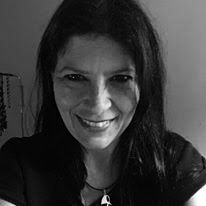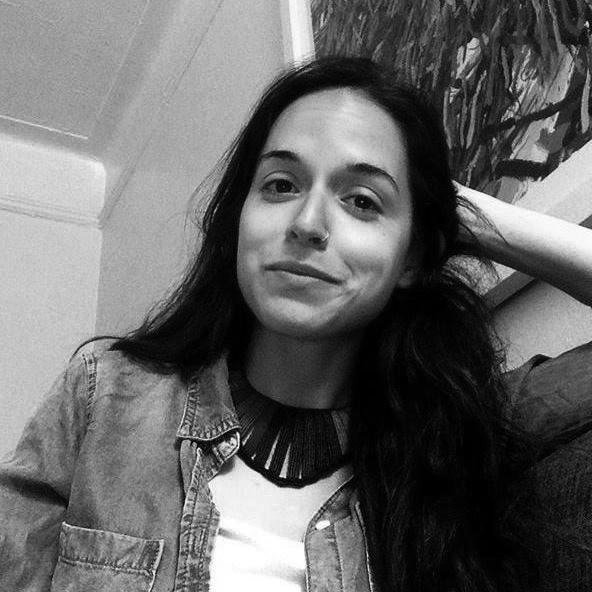Tomboy
translated from the Spanish by Robin Myers
I don’t understand how we walk around the world
as if there were a single way for each of us, a kind
of life stamped into us like a childhood injection,
a cure painstakingly released into the blood with every passing year
like a poison transmuted into antidote
against any possible disobedience that might
awaken in the body. But the body isn’t mere
submissive matter, a mouth that cleanly swallows
whatever it’s fed. It’s a lattice
of little filaments, as I imagine
threads of starlight must be. What can never
be touched: that’s the body. What lives outside
the law when the law is muscled and violent,
a boulder plunging off a precipice
and crushing everything in its path. How do they manage
to wander around so happily and comfortably in their bodies, how
do they feel so sure, so confident in being what they are: this blood,
these organs, this sex, this species? Haven’t they ever longed
to be a lizard scorching in the sun
every day, or an old man, or a vine
clutching a trunk in search of somewhere
to hold on, or a boy sprinting till his heart
bursts from his chest with sheer brute energy,
with sheer desire? We’re forced
to be whatever we resemble. Haven’t
you ever wished you knew what it would feel like to have claws
or roots or fins instead of hands, what it would mean
if you could only live in silence
or by murmuring or crying out
in pain or fear or pleasure? Or if there weren’t any words
at all and so the soul of every living thing were measured
by the intensity it manifests
once it’s set free?
Tomboy
Yo no sé cómo se hace para andar por el mundo
como si solo hubiera una posibilidad para cada cual,
una manera de estar vivos inoculada en las venas durante la niñez,
un remedio que va liberándose lentamente en la sangre
a lo largo de los años igual que un veneno
que se convierte en un antídoto
contra cualquier desobediencia que pudiera
despertarse en el cuerpo. Pero el cuerpo no es
una materia sumisa, una boca que traga limpiamente
aquello con que se la alimenta. Es un entramado
de pequeños filamentos, como imagino que son los hilos
de luz de las estrellas. Lo que nunca podría
ser tocado: eso es el cuerpo. Lo que siempre
queda afuera de la ley cuando la ley es maciza
y violenta, una piedra descomunal cayendo
desde lo alto de una cima
arrasando lo que encuentra. ¿Cómo pueden entonces
andar tan cómodos y felices en su cuerpo, cómo hacen
para tener la certeza, la seguridad de que son eso: esa sangre,
esos órganos, ese sexo, esa especie? ¿Nunca quisieron
ser un lagarto prendido cada día del calor del sol
hasta quemarse el cuero, un hombre viejo, una enredadera
apretándose contra el tronco de un árbol para tener de dónde
sostenerse, un chico corriendo hasta que el corazón
se le sale del pecho de pura energía brutal,
de puro deseo? Nos esforzamos tanto
por ser aquello a lo que nos parecemos. ¿Nunca
se te ocurrió cómo sería si en lugar de manos tuvieras garras
o raíces o aletas, cómo sería
si la única manera de vivir fuera en silencio o aullando
de placer o de dolor o de miedo,
si no hubiera palabras
y el alma de cada cosa viva se midiera
por la intensidad de la que es capaz una vez
que queda suelta?
© 2019 Claudia Masin and Robin Myers. Published in Poem-a-Day in partnership with Words Without Borders (wordswithoutborders.org) on September 28, 2019, by the Academy of American Poets.
“’Tomboy’ comes from a book of mine called Lo intacto, a series of poems based on movies; in this case, Céline Sciamma’s eponymous 2011 film about a gender non-conforming child. The poem came to me in a flash; I barely edited it at all. After I saw the film, I had to speak in the voice of this child as a way to address the damage caused by stagnant conceptions of identity; the need to free this power, which so fiercely resists domestication and regulation, that lives in each of us; and the infinite capacity of our own imaginations for empathizing with what surrounds us. In the end, I think that prejudice and cruelty spring from an utter lack of imagination, an inability to think of ourselves beyond whatever we seem to be.”
—Claudia Masin


